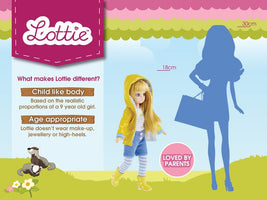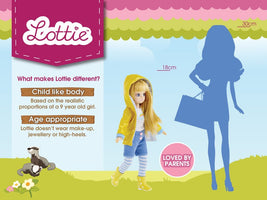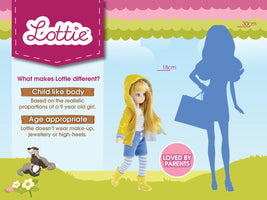Contact: EMAIL + PHONE
FOR IMMEDIATE RELEASE: 11 March 2021
Latest Research Cites Serious Consequences for Childhood Wellbeing and Mental Health
DURHAM, ENGLAND and DONEGAL, IRELAND: Playing with ultra-thin dolls creates damaging effects on the self-esteem of young girls by making them feel dissatisfied with their own bodies, according to a new research study from Durham University.
- The study asked girls aged 5 to 9 to indicate how they perceived their own body size along with their ideal body size.
- When the girls played with the ultra-thin dolls, their reported “ideal self” became thinner.
- In contrast, the study found that playing with realistic children’s dolls did not have adverse effects on girls’ body ideals.
“Alarmingly, 95% of the dolls that parents can actually purchase online or in stores are the ultra-thin type. It’s hard for parents to refuse them when they are heavily marketed directly to young girls,” says leading Irish doll manufacturer, Ian Harkin of Lottie Dolls, whose body-realistic dolls were included in the study. Harkin launched Lottie Dolls in 2012 based on a previous research study that had similar findings.
The research was led by Durham University Psychologist, Dr Lynda Boothroyd. In an official statement released this morning, Dr Boothroyd said body dissatisfaction “is a huge problem, particularly amongst young girls. It can have serious consequences for girls’ wellbeing and lead to eating disorders and depression.”
Harkin says the Durham study is “the most comprehensive report to date on the impact of ultra-thin dolls on girls’ perceptions of their own body shape. It’s time for manufacturers, retailers, toy associations and toy awards to take positive action and stop promoting dolls with unrealistic body shapes in the market.” As Harkin points out, toy industry professionals have read these reports, but continue to ignore the findings.
According to Harkin, toy manufacturers are missing out on an opportunity to develop empathy in kids. “Instead of teaching kids they all need to look the same, why not teach them to embrace who they are, and include other kids instead? We develop dolls with diverse skin colours, body sizes, and abilities, precisely because we want to promote positive self-image, and instill values of kindness and inclusivity.”
More details on the study can be found in the latest issue of Body Image journal:
https://www.journals.elsevier.com/body-image
About Lottie Dolls
Lottie Dolls is an award-winning toy company, launched with a belief that childhood should be an inclusive place where every child belongs regardless of gender, ethnicity or ability. Developed alongside academics in child development, Lottie Dolls are inspired by children, and are based on the body of a 9-year-old, not the body of an adult. Founded in 2012, the company has pioneered diverse and inclusive toys, including the world’s first-ever doll with autism, the first-ever Deaf doll with a cochlear implant, and sent the first-ever doll into outer space. Lottie Dolls are sold in 35 countries around the world, at independent retailers, on www.lottie.com and on Amazon.
![]() Fast Shipping
Fast Shipping![]() Subscribe to our Newsletter
Subscribe to our Newsletter![]() 🌟 New Global Competition 🌟
🌟 New Global Competition 🌟














